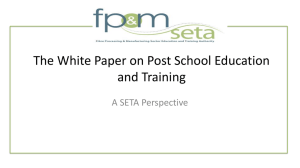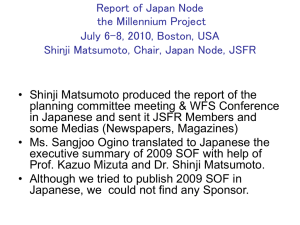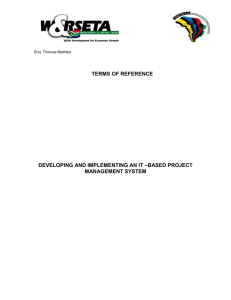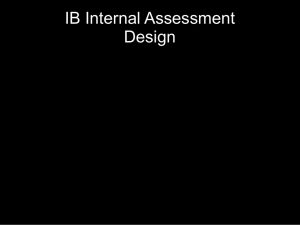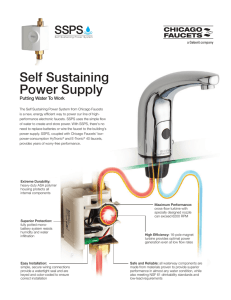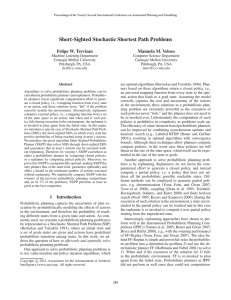ToR for Review of Current Skills Development system
advertisement
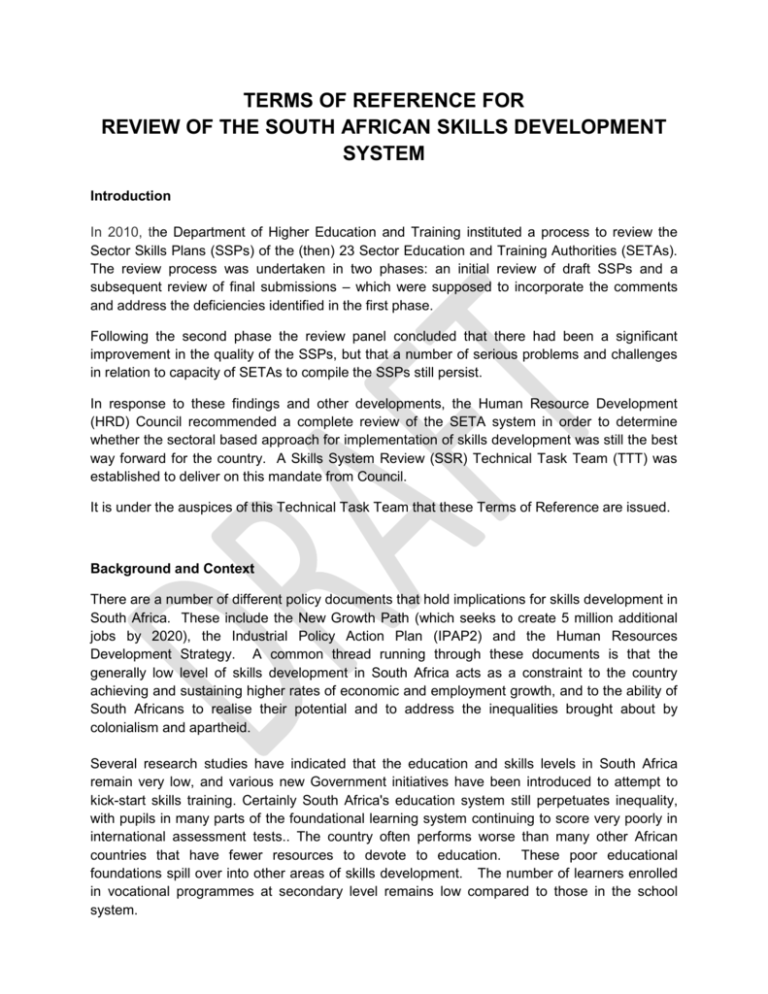
TERMS OF REFERENCE FOR REVIEW OF THE SOUTH AFRICAN SKILLS DEVELOPMENT SYSTEM Introduction In 2010, the Department of Higher Education and Training instituted a process to review the Sector Skills Plans (SSPs) of the (then) 23 Sector Education and Training Authorities (SETAs). The review process was undertaken in two phases: an initial review of draft SSPs and a subsequent review of final submissions – which were supposed to incorporate the comments and address the deficiencies identified in the first phase. Following the second phase the review panel concluded that there had been a significant improvement in the quality of the SSPs, but that a number of serious problems and challenges in relation to capacity of SETAs to compile the SSPs still persist. In response to these findings and other developments, the Human Resource Development (HRD) Council recommended a complete review of the SETA system in order to determine whether the sectoral based approach for implementation of skills development was still the best way forward for the country. A Skills System Review (SSR) Technical Task Team (TTT) was established to deliver on this mandate from Council. It is under the auspices of this Technical Task Team that these Terms of Reference are issued. Background and Context There are a number of different policy documents that hold implications for skills development in South Africa. These include the New Growth Path (which seeks to create 5 million additional jobs by 2020), the Industrial Policy Action Plan (IPAP2) and the Human Resources Development Strategy. A common thread running through these documents is that the generally low level of skills development in South Africa acts as a constraint to the country achieving and sustaining higher rates of economic and employment growth, and to the ability of South Africans to realise their potential and to address the inequalities brought about by colonialism and apartheid. Several research studies have indicated that the education and skills levels in South Africa remain very low, and various new Government initiatives have been introduced to attempt to kick-start skills training. Certainly South Africa's education system still perpetuates inequality, with pupils in many parts of the foundational learning system continuing to score very poorly in international assessment tests.. The country often performs worse than many other African countries that have fewer resources to devote to education. These poor educational foundations spill over into other areas of skills development. The number of learners enrolled in vocational programmes at secondary level remains low compared to those in the school system. It is now widely acknowledged that South Africa’s educational and skills development problems are severe and deep-seated, and that any attempts to address them will require (amongst other things) a much more rigorous, systemic approach that drives skills provisioning at postschooling level through vocational learning, further education and training (FET) and higher education and training (HET) institutions and in the workplace, while simultaneously addressing the weaknesses in the foundational education system. Goal Statement This study will critically review the current skills development system and inform the best model for delivering a skills development system that allows for the coordination and articulation of skills development efforts across all sectors of the economy, and all institutions engaged in the development of skills to support the goals of human resource development in the country. Objectives for the research In accordance with this goal, this study will need to meet the following objectives: Identify the strengths and weaknesses of the current skills development systems, as well as key dependencies and causes for these strengths and weaknesses. Assess the impact of the current skills system on the total employable population. Assess the impact of the current skills development system and the availability of critical and scarce skills on the performance and potential of the economy. Assess the appropriateness of the institutional and systems design for skills delivery including the manner in which it facilitates access to skills, and promotes quality, relevance, mobility and adaptability. Identify and evaluate the linkages and interdependencies between the various skills subsystems e.g. foundational education, Seta’s, HET, FET, etc. Assess the efficiency and effectiveness of the system with respect to the allocation and usage of national resources. Activities to achieve the objectives In pursuit of these objectives, it is anticipated that the following activities will need to be under taken: Conduct a review of current economic and human resource development policies to determine their expectations of the skills development system. Identify, and conduct a review of, existing studies that are relevant to the scope and objectives of this study. Determine the strengths and weaknesses of the existing skills development system using a review of existing studies and interviews with relevant stakeholders or experts. Determine and apply an objective basis for assessing the impact of the skills development system on the performance and potential performance of the South African economy. To revisit through a review of existing studies and interviews in order to determine the extent to which the existing skills system contributes towards the ability of people to access the system, provides high quality, relevant skills, and facilitates mobility by providing skills that are recognized and transferable. To revisit the existing institutional landscape in order to determine the functionality and effectiveness of linkages and interdependencies between different elements of the skills development system. Determine the existing capacities of the current system, and identify any gaps in the extent to which sectors or other interests are accommodated in the current system. However, the service provider may propose additional activities, or alternative approaches Research skills and Methodology The appointed service provider will be required to demonstrate that they have the necessary skills and competencies within their research team to undertake this study. They will also need to propose and describe the study method and the key questions that they believe will best meet the objectives of this study in their proposal. Deliverables The key deliverables of this project will be: Interim progress reports and presentations. The number and required date of delivery of these will be laid out in the project plan. A draft report covering all the objectives outlined above. A final report, including an executive summary. A presentation summarizing the key findings and recommendations. All documents secured in the process Reporting The Skills Systems Review Technical Task Team will appoint a reference group to interact on an ongoing basis with the appointed service provider. The nature and extent of this interaction will be laid out in the project plan. Time frame The project will run from August 2012 to 31 March 2013. The detailed project plan will be agreed between the Reference Group and the service provider immediately following the latter’s appointment. Terms of Payment The project plan and contract will stipulate payment milestones linked to key deliverables.

